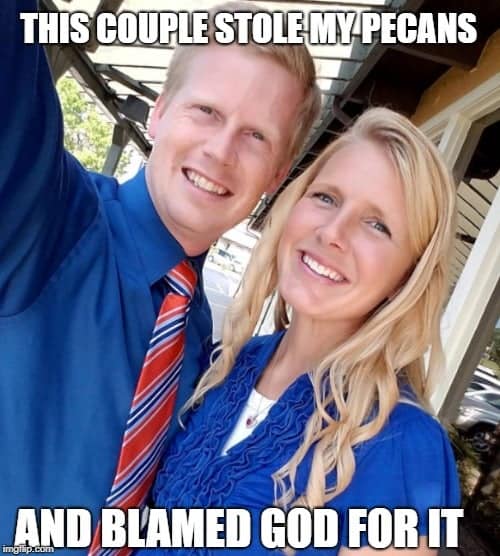This is a slightly edited repost of a post I wrote when I first started blogging last summer. I’m reposting it for new readers. This post explains how I moved from evangelical Christianity to atheism over a process that took some years to complete. Here is the original.
Everyone who leaves the Quiverfull movement, Christian Patriarchy, or evangelical or fundamentalism in general has a long journey in front of them. They have to sort through everything they have always believed and determine what to throw out and what to keep, what still makes sense and what does not. This can be a long and difficult process, and can even take years.
I had been taught all my life to take the Bible literally, to believe that God created the world in six days, that Abraham and Moses really existed and did and said what the Bible records, that every word of the Gospels was true as written, and that Paul really did tell women to submit to their husbands and not work outside of the home. The Bible, I was taught, was infallible, without error of any sort, and was my guide for life. But when I found in college that my parents’ views on evolution were wrong, and that the Biblical account of creation could not possibly be literally true, I had a problem. What was I to believe?
This was actually the point where I first questioned my beliefs about patriarchy. I had wholeheartedly endorsed patriarchy up until this point, but if my dad was wrong about young earth creationism and the literal truth of the Bible – and he made this issue the very foundation of his faith and taught it to us with a passion rivaled only by his very belief in God – I realized that something was seriously out of place. Put simply, my father was wrong. And if he was wrong about this, what else was he wrong about? And how could I submit to him and make his beliefs mine if I knew he was wrong? And with that, I let go of Christian Patriarchy.
But at this point, I had bigger problems to worry about. I had been taught I that had to take the Bible literally but now I simply could not do that. In addition, when I delved further, asking questions I had never thought to ask before, I realized that, taken literally, the Bible was wrong both factually and ethically.
First of all, not only is the Bible wrong about how the world came into being, it is also wrong in numerous particulars, such as how many Israelites left Egypt (the Bible says there were 600,000 men of fighting age, which would mean about 2,000,000 people total, but at the time there were only 6,000,000 people in all of Egypt and only about 50,000 people in Canaan) and the correct dates for the existence of the various Canaanite tribes. In addition, the four Gospels contradict each other mercilessly and contain historical inaccuracies (how many donkey’s did Jesus ride on Palm Sunday? it depends on which gospel you read. similarly, therewas no empire-wide census in the days of Augustus). Sure, I had been taught to explain these things away, but I suddenly realized that those explanations made no sense when I looked at the problems honestly, and not simply out of a desire to justify my faith.
Second, I began to find that the Bible had ethical problems. God commands the Israelites to commit genocide, killing thousands of men, women, and children and wiping out entire nations. The law God gave to Moses treats women as property and even instructs fathers on how to sell their daughters into slavery. The New Testament was not immune to this either; God strikes Ananias and Sapphira dead for the simple act of lying. And this is a good, perfect, loving God? Something was seriously wrong here. And then, of course, there is the issue of sending people around the world whose only transgression is not ever hearing about Jesus to eternal torment in hell. I suddenly could not fathom how a loving God could do that.
Now that I saw the Bible as riddled with errors and filled with genocide and misogyny, I could no longer believe it was infallible in any literal sense. How was I to understand it? I had a problem on my hands. But of course, I wasn’t about to throw out the baby with the bathwater. I couldn’t very well reject Christianity – it was the core of my existence. So I set out to sift through the bathwater and find the baby. And in this process, I did what many recovering fundamentalists have done: I turned to Catholicism.
The Catholic Church admits that there are errors in the Bible, which it sees as a very human book that simply contains kernels of greater truths rather than literal truth. The Old Testament Law and the genocides were merely a tribal society’s way of understanding God, rather than being God’s actual perfect commands. This was an understanding of the Bible that I could accept, and, somehow, it made the Bible more beautiful, more rich and complex, than before. In addition, the Catholic Church teaches that Jesus came to die for all of humankind, whether they had heard of him or not. Anyone who lives life with the right heart attitude will be saved through Jesus, whether they hear of him or not. This made so much more sense. I mean, if I were Jesus, I’d die to save everyone, not just the few who might hear and believe.
And on top of that, the Catholic Church offered beauty, richness, tradition, history, and belonging. I studied the early church and found that even the earliest Christians practiced infant baptism and believed in transubstantiation. There was something beautiful about the sacraments and the ritual and the history. It fulfilled my heart’s desires. The saints became my cheerleaders and Mary my surrogate mother. I had new friends who accepted me for what I was, and did not judge me. There was comfort and contentment there. There was acceptance, and I loved it.
But once I had begun to think the questions kept coming. Why did the church condemn birth control? Why was masturbation wrong? Why did priests have to be celibate? Just believe, the Catholic Church said. Just accept. We know what is best. It became all too familiar. The beauty and richness was still there, but the hierarchy began to feel stifling. When I took issue with certain things in the church, super-Catholics told me I wasn’t being a good Catholic. Just believe. And I couldn’t do that.
At the same time, I suddenly found that I had other even more troubling questions. Why couldn’t God just forgive people, why did he have to have his son murdered in order to be able to do so? This made no sense. When someone hurtme, I didn’t have to have something murdered in order to forgive them. It suddenly seemed to me that Christianity was built on the foundation of actual literal human sacrifice, and I felt repelled. And besides that, how does God have a son who can come to earth and die, and yet he and this son are one being, together with the Holy Spirit? Let’s face it, the Trinity makes no sense. How do theologians defend it? “Human minds cannot comprehend the mystery of it,” they say. “Just believe.” Sorry, can’t do that, I stopped doing that a while back and I won’t do it again. If the Trinity makes no sense, it makes no sense. You can’t just make it so.
With a very human Bible and Christian doctrine that didn’t even make sense anymore, I had a problem. I began to wonder if there actually was a baby in the bathwater at all.
One thing I still held onto as proof of Christianity was my relationship with Jesus. He and I had been best friends since I was a little girl, and he was always there for me. I talked to him constantly, depended on him, loved him. He was so real to me – Christianity couldn’t possibly be wrong, could it? And then I started to realize something. Christians have set it up so that God can never fail them. Your child survives cancer? Praise God! He healed your child! Your child dies of cancer? It was God’s will, and he’s teaching you things through it.
In practice, whether God exists or not is completely irrelevant. Christians don’t get sick less, they don’t have greater financial success, and studies have shown that prayer does not actually help. And as I pondered it, I realized that there was nothing about my relationship with Jesus that could not be pure imagination. In fact, that’s what it was: Jesus was my imaginary friend. And with that, I let go.
It took me almost five years from start to finish, but in the end I concluded that there was no baby in the bathwater after all. You can’t force yourself to believe something you simply don’t believe anymore, and my faith died a quiet and peaceful death. I realize that for many Christianity can embody some excellent impulses – love, service to others, charity – but no matter what people make of it, it no longer appears to me to be divine in any sense. I can appreciate it for its history, beauty, and tradition, but I no longer believe it.
I have walked beyond the borders of religion and found that the world is still a beautiful place, filled with wonder, love, and joy. I have finally found lasting contentment and answers to the questions that before had never stopped pestering me. My journey has led me to a place that has, for me, brought freedom in mind, body, and soul. Life makes so much more sense to me now, everything all fits into place, and because I now believe I have only one life to live, I am living it to its fullest with no regrets.













